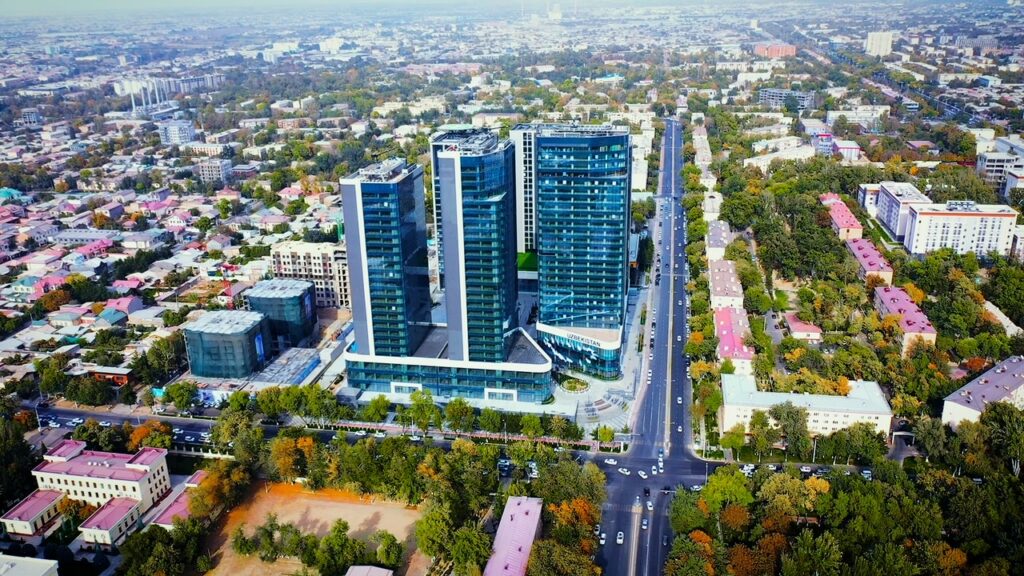I just returned from Uzbekistan, where the country’s government hosted its annual ICT Week spotlighting tech advancements from the past year, unveiling new projects, and luring international investors.
When I first landed at the airport Tashkent, Uzbekistan’s capital, I did not know what to expect. I have only known little about Uzbekistan from my SciencesPo Paris undergraduate class about the Silk Road, where I learned about the cultural and economic exchanges in the region. In the past, the country has been known for its Soviet past, cotton fields and agriculture.
The infrastructural transformation I saw across the city took me by surprise: New shiny hotels, extensive parks, residential areas with restaurants and promenades, stadiums, and expo infrastructure. All these buildings were brand new and spotlessly clean, against the backdrop of the historical parts of the city.
While Uzbekistan has clearly overcome a lot of obstacles, selling its story to foreign investors and getting them to bet on its future is an ongoing challenge.
The primary emphasis of the ICT Week event centered on the initiative inaugurated by the Uzbekistan IT Park — the IT Outsourcing program, which aims to attract foreign investors and companies while providing support for emerging regional startup projects.
My trip along with other journalists, which were sponsored by the Ministry of Digital Technologies of the Republic of Uzbekistan, can also be seen as a part of the government’s efforts to raise awareness of this New Uzbekistan.
Alongside that, other initiatives and programs are being launched to draw in venture capital firms, promote IT education at colleges, and achieve equal gender representation in the technology sector.
“Uzbekistan has been completely overlooked by the international market when it really deserves not to be,” said Stephen Lin, venture capital partner at Sturgeon Capital and founder of Swiftlaunch incubator, about why the company decided to invest in the country. “There are still foundational industries that have not been captured yet.”
Looking closely at Uzbekistan there are numerous factors that attract investors and enable startups to set up their offices: Rapid digitalization driven by widespread smartphone and internet use, a sizable and well-educated, multilingual young population, a growing gross domestic product (GDP) structure, improved infrastructure, and a diversified economy.
However, there are also obstacles. The most prominent being the lack of knowledge about the region alongside a tough competitive regional market, lack of angel investor network, and overall shortage of funding for new projects.
“Some countries focus only on IT, but in Uzbekistan’s case, we are looking for business process outsourcing as well,” said Sherzod Shermatov, the Minister of Digital Technologies of the Republic of Uzbekistan, expressing his enthusiasm about technological developments during an interview at IT Park in Tashkent. He believes that the post-COVID-19 surge in demand for outsourcing companies due to remote work has led Uzbekistan to place its bets on this new program.
Many investors, startups, and visitors enthusiastically embraced the vision of a digitized future for the country as they gathered in the modern, brightly lit halls of the Central Asian Expo (CAEx). Engaging in lively discussions on new partnerships and exploring innovative projects from the booths within the expansive industrial hall, the tech future of Uzbekistan appeared to be on the path to success.

‘The Perfect Place to Outsource’
For investors and companies, Uzbekistan offers numerous advantages, including a swift business startup process taking just 2-3 days and affordable internet costs. The country’s accessibility is enhanced by eleven international airports, providing flights to over 50 destinations, including direct flights to the U.S. Moreover, Uzbekistan maintains a visa-free regime for citizens of over 90 countries.
Since the political democratization initiated after the passing of the previous authoritarian leader, Islam Karimov, in 2016, the nation has implemented reforms to liberalize the economy, enhance political freedoms, and combat corruption for political stability.
In the IT park alone the export volume increased 48 times since 2019 from 6.2 million in 2019 to 300 million in 2023. Majority of these exports include IT-enabled services, business process outsourcing (BPOs) and IT products. Furthermore, the number of companies with foreign capital increased sixteen fold since 2019 reaching 250 in 2023. At the same time, the number of IT park residents increased four times and the number of employees five times in the past four years.
IT outsourcing has been on top of the agenda for the Ministry of Digital Technologies of Uzbekistan for a while. Five or six years ago there was almost nothing to show according to Farkhad Ibragimov, the CEO of IT Park in Uzbekistan He goes on to explain how the growth was achieved.
The primary drivers of this success are legislative changes, the implementation of tax incentives, and the diversification of the IT sector.
Since 2017, Uzbekistan has enacted 15 new legislative acts aimed at attracting foreign companies, particularly those offering services in international markets. Notably, these alterations facilitate salary payments in foreign currency for IT specialists, enhancing the country’s appeal. Furthermore, the government has proactively granted tax incentives to both educational and IT entities, fostering a diverse and skilled workforce. The ministry has also expanded its definition of “Enabled Services,” now encompassing Business Process Outsourcing (BPO) and Knowledge Process Outsourcing (KPO), broadening the spectrum of services beyond traditional IT offerings.
In addition to these factors, Uzbekistan’s tech growth has been driven by initiatives such as a focus on human capital, infrastructure development, global outreach, international collaboration, and strategic marketing efforts. This multifaceted approach has propelled Uzbekistan into the global tech arena, contributing to its technological expansion.
“Now we achieved good results,” he adds. Since then, Uzbekistan has evolved by implementing legislative improvements, tax incentives, and educational initiatives to support the industry.
A ‘One Stop Shop’ for IT Outsourcing
Uzbekistan aspires to position itself as a “one stop shop” for companies establishing outsourcing branches, claiming a competitive edge in the region.
The cornerstone of this program is a tax incentives policy, granting residents of the IT Park 0% corporate, social, property, and land taxes. Additionally, there is no VAT on imported services, and a 7.5% personal income tax applies. Uzbekistan further facilitates the process by assisting with legal entity registration, bank account opening, and tax authorities registration.
The remaining pillars of the IT residency program encompass relocation and softlanding. Companies relocating to Uzbekistan will not require a work permit, and an IT visa, valid for up to three years, will be provided for investors, programmers, and founders.
IT Park also offers support with office space selection, accommodation, and assistance in school and kindergarten allocation for workers.
Uzbekistan is actively extending new opportunities to foreign firms and investors. The “Zero Risk” one-year program, features complimentary office rent, technical equipment for up to 100 people, coverage of up to 15% of employee salaries, training grants of up to 50%, and compensation for human resources (HR) services, positions the country as an enticing destination for investors.
Furthermore, the “Local to Global” initiative provides additional relocation incentives. These include access to free Coursera courses, sponsored travel to Uzbekistan for clients, 50% compensation for export consultancy services, participation in an export mentoring program, and reimbursement for overseas business trips. Uzbekistan envisions that this distinctive value proposition will encourage more companies to establish their offices in the country.
Remaining Challenges
Despite the significant breakthrough over the past four years and the introduction of numerous new initiatives by Uzbekistan, the country continues to grapple with the lack of awareness of the country as well as the region as a whole.
When dealing with foreign investors, their primary concerns are twofold, including the talent availability and the general lack of knowledge about Uzbekistan. This poses a challenge for the government in persuading companies to relocate and alter negative perceptions.
“When we tried to persuade those companies to locate their offices in Uzbekistan, they didn’t have much idea about Uzbekistan, and whatever they got from the internet was mostly outdated up until 2016,” said Shermatov as to the challenges faced by the government in attracting foreign investment. The historical isolation and neglected education policies create an outdated negative perception.
Another major challenge for Uzbekistan is the fact that it’s competing against a highly saturated IT market.
“The business world is very competitive, especially in the IT industry. You cannot forget that we are competing with countries like India, Tel Aviv, Colombia, or Eastern Europe,” said Nodir Turdimatov, the CEO of Revotech, a fast-growing outsourcing company, during a panel discussion at the ICT Week. “So it’s a very competitive market,” he added.
The final challenge can be seen in the lack of an angel investors network and an overall shortage of funding in the region.
“There is no network of angels within the region,” said Chubak Temirov, the CEO of High-Tech Park Kyrgyzstan, during a panel discussion on Central Asia’s Emerging Digital Market emphasizing the challenge including a shortage of startup capital, legal framework issues, limited awareness of investment opportunities, the need for investor education, and a lack of simulation scenarios for angel investments.
The trip to Uzbekistan was eye-opening for me. Originally from the Czech Republic, the digital transformations I witnessed during the one-week tour reminded me of the stories my parents shared with me as our country gained independence from the Soviet Union in 1989. Now, it appears to be Uzbekistan’s turn for a similarly rapid transformation and fully joining the global race and competition for IT talent and investments.
Editorial Note: While we have maintained editorial independence and control over the material, we want our readers to be informed about the sponsorship by the Ministry of Digital Technologies of the Republic of Uzbekistan that facilitated this coverage.





Add comment